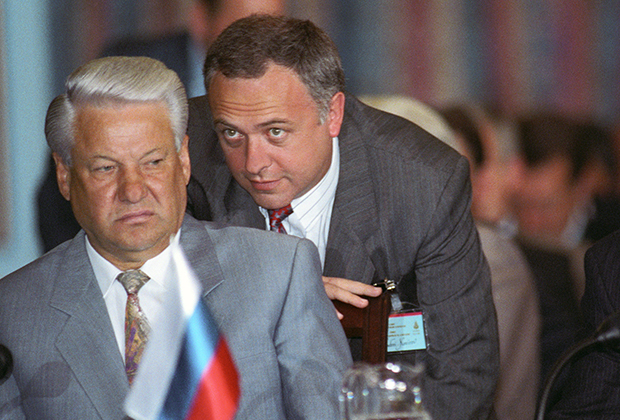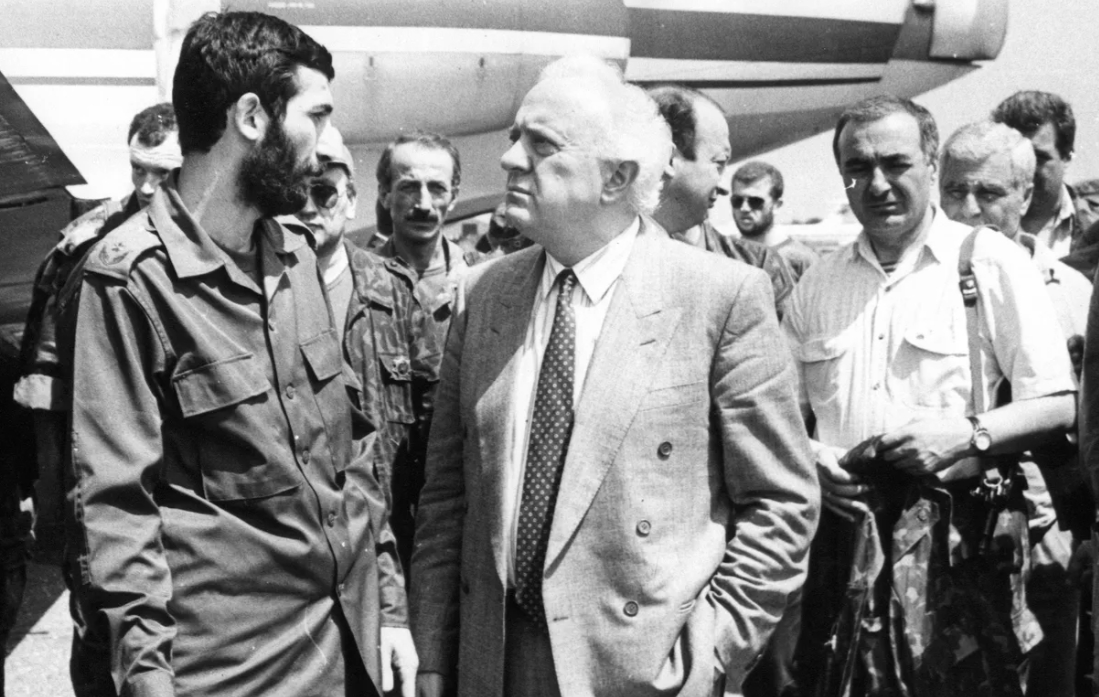The Triumph of Abkhazian Diplomacy: Marking 30 Years since the Tripartite Agreement in Sochi

Sokrat Dzhindzholia (left), Vladislav Ardzinba (centre).
The ceasefire accord between Abkhazia and Georgia, along with the mechanism to monitor its enforcement, was signed by Abkhazia's Prime Minister Sokrat Dzhindzholia, Georgia's Parliament Chairman Vakhtang Goguadze, and Russia's Foreign Affairs Minister Andrei Kozyrev.
Delve into the events that culminated in the pivotal agreement for the withdrawal of Georgian troops from Abkhazia on July 27, 1993, and comprehend the profound importance of this accord.
"The July Agreement emerged from the ebb and flow of military events. During the Georgian-Abkhazian conflict, negotiations were frequently disrupted and then resumed, leading to a raft of agreements, the majority of which remained unfulfilled. This agreement represents the first international document that recognizes Abkhazia as an autonomous entity. According to its terms, Georgia was obliged to withdraw its troops, allowing the rightful leadership of Abkhazia to regain control of the capital, Sukhum. The signing of this agreement indicated that Georgia had unlawfully deployed troops on Abkhazian soil," asserts historian Aslan Avidzba.

Historian Aslan Avidzba
The signing of the agreement was a direct result of the successful outcomes of the July offensive. Abkhazia, bolstered by its Armed Forces, managed to reach its interim goal - the liberation of Sukhum. Consequently, it persuaded both Georgian and Russian sides to incorporate these clauses into the agreement.
"The Georgian side found itself compelled to sign a treaty that necessitated the withdrawal of its troops, primarily because it was unable to maintain military control over Sukhum at that time. If circumstances had been different, Georgia would not have agreed to such terms. As for Russia, it assumed a mediatory role in this conflict. Pushing for a ceasefire, it had no interest in combat actions that would lead to drastic shifts in the front's balance of power," the historian explains.
Shuttle Diplomacy of Boris Pastukhov
In an interview, Sokrat Dzhindzholia, former Prime Minister of Abkhazia, expressed his views on the agreement of July 27, 1993.
"Almost immediately, Georgia began to infringe upon the ceasefire agreement, revealing its lack of commitment to its stipulations. Georgia's situation at that time was precarious. By July, the mainstay of the Georgian forces was disintegrated, making Abkhazia's victory imminent. However, considering Georgia's military and technical capabilities, Abkhazia aimed to avoid a high casualty rate, hence the acceptance of the agreement," Dzhindzholia emphasised.

Russian President Boris Yeltsin and Foreign Minister Andrei Kozyrev.
The Abkhazian statesman also recollected the viewpoint of Andrei Kozyrev, the Russian Foreign Minister at the time, who believed in the necessity of a 'unified' Georgia.
"Kozyrev posited that Georgia was the key stronghold and bulwark of stability in Russia's North Caucasus region, shielding it from the spread of any form of extremism. He asserted this viewpoint on July 13, 1993, a fortnight prior to the agreement's signing," he added.
During the July and September offensive, Boris Yeltsin's representative, Boris Pastukhov, engaged in what was termed 'shuttle diplomacy.'
"Pastukhov barely remained in the city for more than two days. He would swiftly move from Moscow to Gudauta, then from Gudauta to Tbilisi, and from Tbilisi back to Moscow. He relayed each leader's standpoint to the others, attempting to foster mutual consensus. However, from the war's onset, President Ardzinba maintained that the conflict's only resolution would be the withdrawal of Georgian forces from Abkhazia. He expressed this belief even in the darkest times, and the Abkhazian side upheld this stance until the very end. This steadfastness, I dare say, bore fruit. Nevertheless, without our battlefield successes, our demands would not have been acknowledged," Avidzba affirmed.
+ The Georgia-Abkhazia peace process: Agreements Database
+ "Surprise" for Shevardnadze: Results of the 1992 Moscow Agreement
+ Stanislav Lakoba: "If Yeltsin had been opposed, the war in Abkhazia would not have started"
Shevardnadze's Dilemma
Historian Avidzba elaborated that the decision in Georgia wasn't solely the leader's responsibility. Shevardnadze found himself in a tough situation as he encountered opposition, who were vehemently against the agreement's signing. The opposition were harsh towards Shevardnadze, branding him a traitor and labelling the agreement a capitulation treaty. Meanwhile, Shevardnadze promised not to abandon Sukhum and vowed to reincorporate Abkhazia into Georgia, despite the agreement.

Georgian General Giorgiy Karkarashvili (left) and Georgian President Eduard Shevardnadze in Sukhum.
At 8:00 on July 26, Georgian radio aired Shevardnadze's appeal to the Georgian and Abkhaz peoples, which stated, "The future of the Georgians and Abkhazians should be determined by these peoples themselves. There are no disputed issues between our peoples that we cannot resolve independently. The combined efforts of Abkhazians and Georgians should unify the divided Abkhazia and establish its statehood within Georgia. We need to create a situation that safeguards the culture, language, and uniqueness of the Abkhaz people... We require a significant effort and goodwill to restore normal living conditions in all cities and regions of Abkhazia and to enable the return of refugees to their homes. I am deeply convinced that the Georgian and Abkhaz peoples will rediscover paths to each other's hearts, and together, we will foster peace in our homeland."
"Notably, this message didn't mention a word about the withdrawal of Georgian troops from Abkhazia," writes Aslan Avidzba in his book "Problems of Military-Political History of the Patriotic War in Abkhazia (1992-1993)".
Despite the agreement's significance, the Abkhaz parliament also harboured mixed feelings.
"On July 26, a debate took place during a session of the Supreme Council of Abkhazia, presided by Vladislav Ardzinba, on the matter of concluding an agreement with Georgia, which resulted in disagreements. Some parliamentarians argued that its signing would merely perpetuate the status quo, not resolve it, and contended that military means were the only way to liberate Abkhazia, as the Georgian army wouldn't voluntarily depart. It's worth noting that these arguments were validated by the unfolding of events. Following the discussion, and after considering the amendments, the deputies leaned towards the advisability of signing the agreement. A delegation from the Republic of Abkhazia was formed to participate in the signing. The decision to sign the agreement on July 27 in Sochi was assigned to Sokrat Dzhindzholia, the Prime Minister of Abkhazia," an excerpt from Aslan Avidzba's book reads.
+ Thirty Years' War. How the Georgian-Abkhazian war changed history, and history changed the war | Interview with Arda Inal-ipa and Paata Zakareishvili
+ JAM NEWS: Interview with Paata Zakareishvili on Georgian-Abkhazian Conflict & Negotiations (Video)
+ Georgian-Abkhaz War | FBIS Reports (Aug-Oct. 1992)
A Chance for Peace
On July 27, 1993, a tripartite peace agreement was signed in Sochi to end hostilities in Abkhazia. The signatories included the Prime Minister of Abkhazia, Sokrat Dzhindzholia, the Chairman of the Parliament of Georgia, Vakhtang Goguadze, and the Minister of Foreign Affairs of the Russian Federation, Andrei Kozyrev.
The agreement specified that all parties involved in the conflict should strictly observe the ceasefire from July 28, 1993, and refrain from any acts of aggression towards each other.
"At the second Congress of the International Circassian Association in Maykop, it was declared that should the peace agreement be violated, the Circassians, along with representatives of other North Caucasus peoples, were ready to defend Abkhazia by all available means. All these statements and actions spoke volumes about the severity of the situation, against which the Joint Commission for the Settlement in Abkhazia was supposed to commence its operations. The sequence of events left no room for doubt: the ceasefire agreement was far from signalling the end of the war," Avidzba writes in his book.
In his book, "The Abkhazian Tragedy," Vitaly Shariya notes that the people of Abkhazia approached the peace process with extreme caution.
"Despite the Georgian side delaying the troop withdrawal, especially their heavy equipment, progress was still being made. The people of Abkhazia, acutely aware of the weight carried by promises and reassurances from the Tbilisi leadership, approached the onset of the peace process with caution. The prospect of such a 'ceasefire' seemed complex. Yet, they understood that this chance for peace could not be missed," reads an excerpt from Shariya's book.